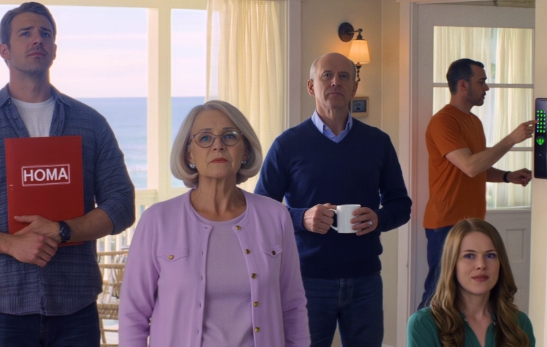The sun had already dipped behind the dunes of Laguna Bay when the lights of the blue-trimmed beach house flickered on. From the veranda, the last orange streak of the setting sun could still be seen, shimmering on the surface of the water. The wind brought with it the rustling of the palm trees and all the simple peace Thomas Whitman had wanted to give his parents.
He had bought the house for them as a gift — $425,000, a lifetime’s worth of gratitude. Twelve years of operating room smells, late nights fueled by black coffee, lost weekends, and uncelebrated birthdays had all condensed into this house: the first thing he had given them from a place of genuine love, not obligation, but affection.
That evening, Thomas arrived with a cake, chocolate-coated with thick whipped cream, because he wasn’t giving up the celebration. He had even had the key made with a new brass cover, so his parents would feel at home in every detail.
But when he turned into the quiet cul-de-sac, something changed.
A black SUV was parked in the driveway, unfamiliar, too big, too loud. The light from the veranda filtered out, but the house was filled with noise that didn’t belong: fragmented speech, unnecessary confidence, a radio blaring too loudly.
Thomas tightened his grip on the cake box, entered, and found his mother in the kitchen. She smiled desperately – the kind of smile she adopted when trying to maintain peace between two incompatible forces.
His father sat in the armchair, shoulders tense as if trying to make himself smaller – as he had his entire life when something was too much for the world.
In the living room, children’s toys were scattered on the rug. On the couch sat a woman — Thomas’s sister, Laura — talking on the phone as if she were the new owner of the house. At the kitchen counter stood his brother-in-law, Greg, occupying the space with such ease it was as if he had designed the house himself.
“Oh, hey, Tom,” Greg said without even looking up. “Nice place you’ve got… for us.”
This was the moment when Thomas placed the cake on the counter. Not because his hand was shaking, but because he knew that if he held it any longer, he’d break the box.
“For us?” he asked softly.
Greg laughed.
“Well, sure. Laura said this was going to be a family house. The grandparents are too old for such a big place. We’re about to move. Makes sense, doesn’t it?”
His mother flinched. His father slowly lifted his gaze, silently asking: Son, are you okay?
Thomas took a deep breath. The floor beneath his feet creaked — a sound that seemed to echo through the house, as if the house itself were asking: Say it now.
The evening suddenly became quieter than it should have been. The sound of the ocean was muffled, and somehow even the seagulls had stopped crying. Thomas looked around and saw what had truly happened.
Boxes everywhere. A half-eaten chocolate bar on the couch. A laptop on the kitchen table with Greg’s accounting software open. A handwritten note: Room layout – let’s discuss.
It looked like they had already moved in.
Thomas knew then that this wasn’t a misunderstanding. It wasn’t innocent enthusiasm. It was a take-over — before he had even arrived.
And he, who sews people’s brains together with millimeter precision, now felt something trembling in his heart for the first time.
“Mom, Dad,” he said quietly, “come out to the veranda with me.”
When they were alone, his mother’s face glistened with tears in the outside light. His father only said:
“Son… we didn’t want trouble.”
Thomas closed his eyes. How many times had he heard this from them as a child? When they lived under the shadow of uneasy landlords, late bills, or overbearing relatives.
“But this is your home,” he said. “No one else’s.”
His mother nodded, and with a single sentence, she condensed fifty years of sacrifice:
“We just wanted… to make you happy.”
Thomas went back inside the house.
And then he said the sentence that stopped Greg’s smile.
“This house is not a family property. It’s not joint. Not ‘for everyone.’ This house belongs to my parents. Period. And now I’m asking you to leave within ten minutes.”
Laura blinked first.
Greg jumped up.
“Don’t tell me what to do!” he shouted at Thomas.
Thomas slowly raised his hand.
“But I will. Because this is my decision now. I won’t let my kindness become someone else’s campsite.”
The silence suddenly became cold, but clear.
Greg muttered something, but he already knew: he had lost.
Within ten minutes, the black SUV rolled out of the driveway. Laura glanced back one last time; her face wasn’t filled with anger, but with a slowly dawning realization.
Thomas went back inside. His parents were sitting in the living room, as though a decade of weight had been lifted off them.
“Son,” his father said, “you didn’t have to do this for us.”
Thomas smiled.
“No. I did this for us.”
That evening, the three of them sat on the veranda. Only the three of them ate the cake — slowly, quietly, in a peace they hadn’t felt in a long time.
And the house, the new home, seemed to sigh with relief.
Because for the first time, it was truly inhabited by those for whom it was meant.
And the sea, as if blessing them, rhythmically struck the shore rocks.
And it was then that Thomas felt it for the first time: what he had placed down today was not just a cake — but a boundary. The beginning of a new life. For all of them.
